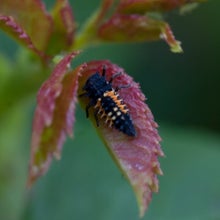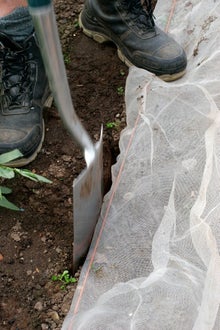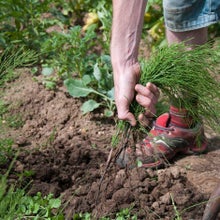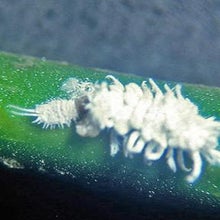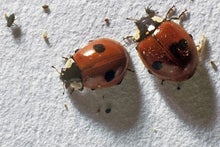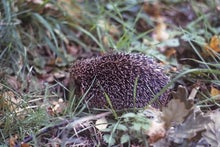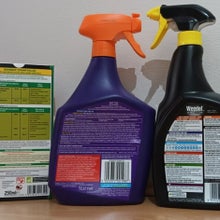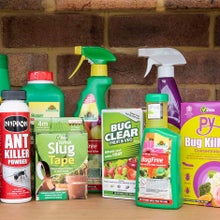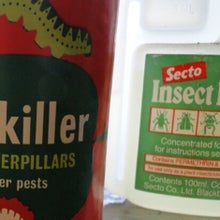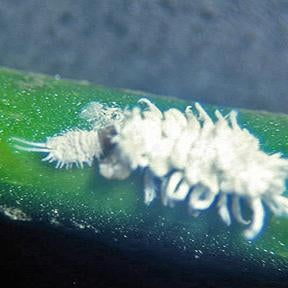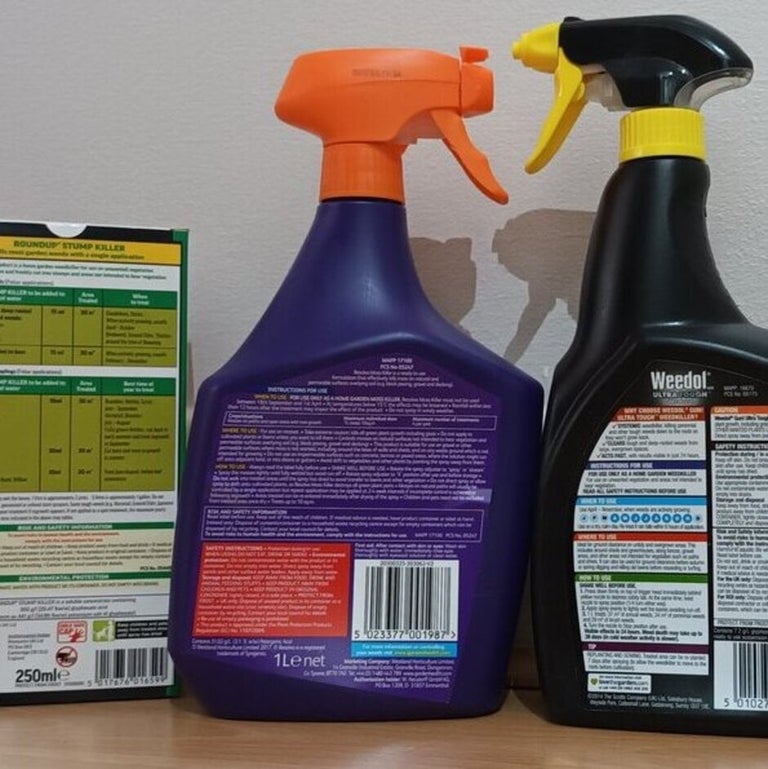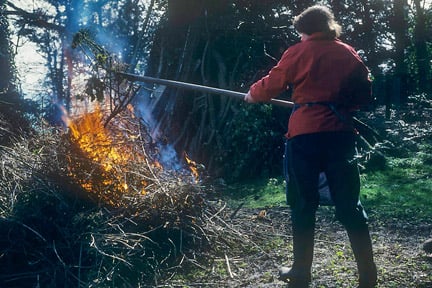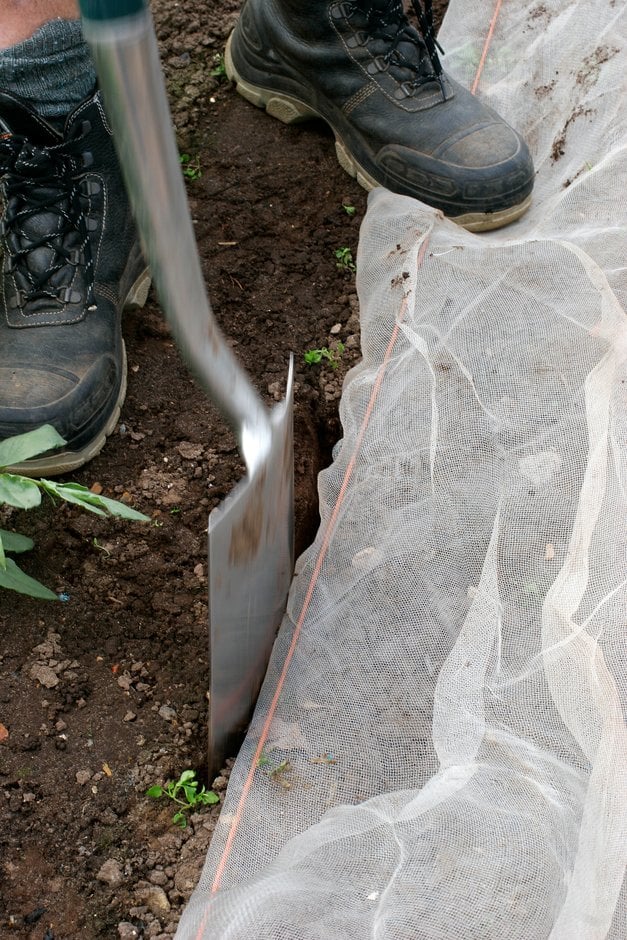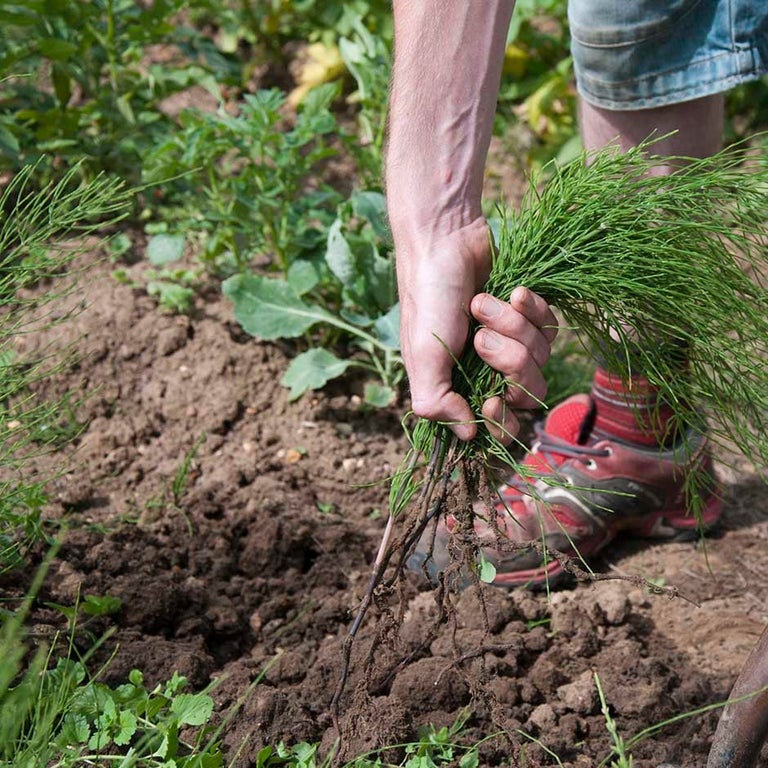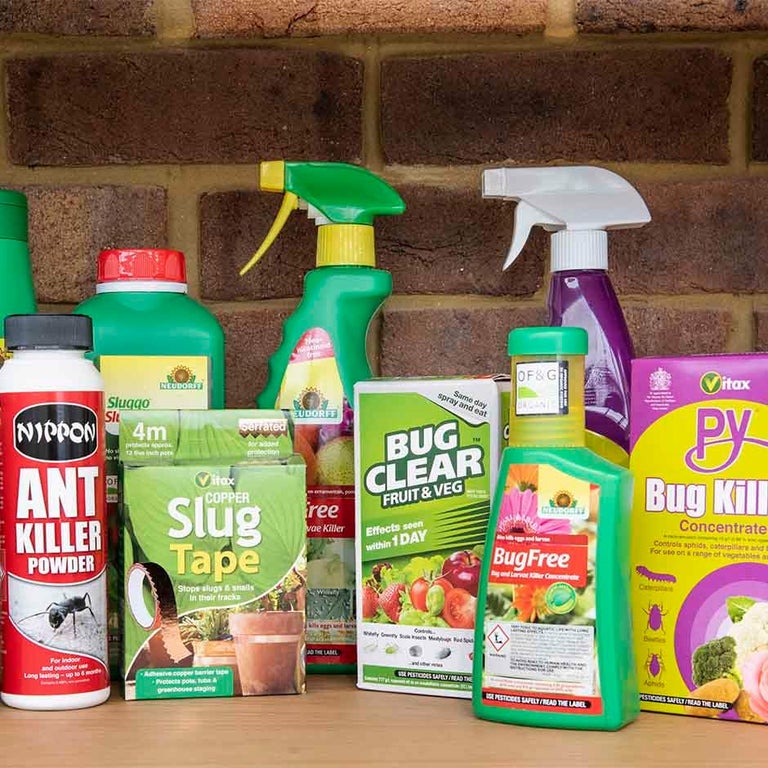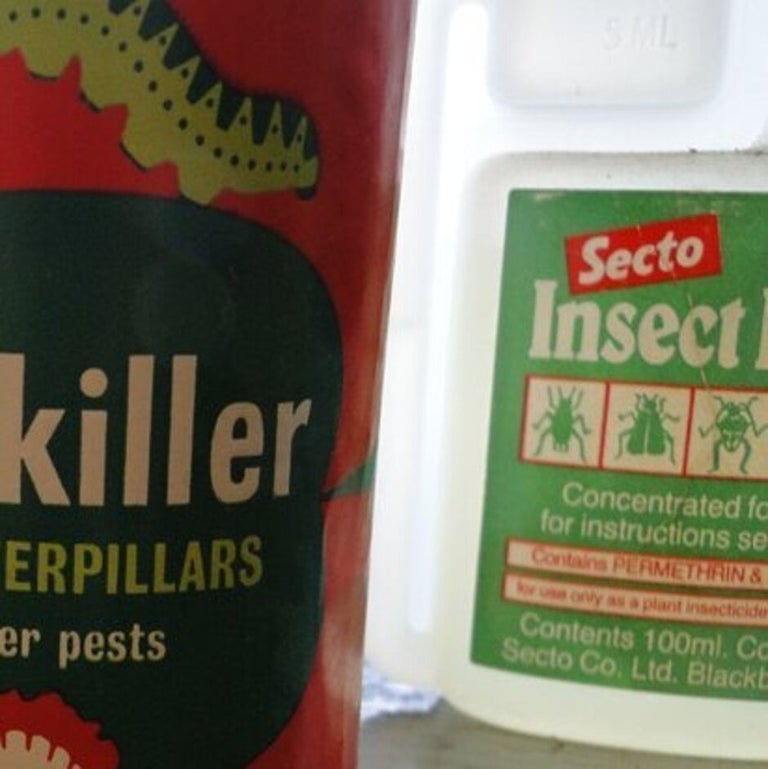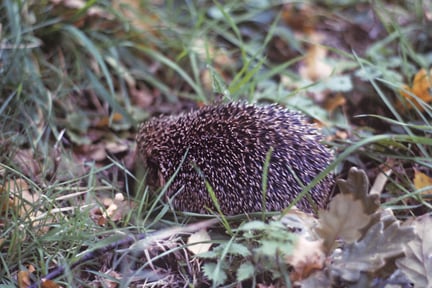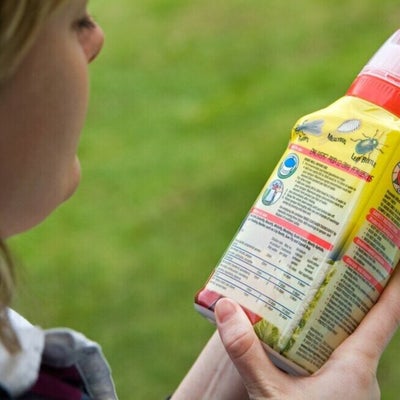
Quick facts
The presence of wildlife, weeds and plant diseases is part of a healthy, diverse and resilient eco-system
Pesticides, also known as plant protection products, include insecticides, fungicides, herbicides and molluscicides
The RHS doesn’t support the use of pesticides and recommends that gardeners use non-chemical control options whenever needed
Do I need to use chemicals?
No – many attractive and productive gardens thrive without the use of chemicals. Many organisms labelled as pests are a natural part of the garden ecosystem and a food source for other wildlife; many so-called weeds are UK wildflowers that boost the of our gardens.

What is a pest?
The term ‘pest’ has traditionally been used to describe animals, particularly insects, that cause damage to plants. These herbivores are an important part of a garden’s biodiversity, and the RHS now encourages gardeners to view them as wildlife in the wrong place. Controlling these animals is often not necessary, as plants are generally able to tolerate some feeding damage, but where populations build up to higher levels, you may consider these animals to be pests and decide to take action to manage them. It would be difficult and inadvisable to eradicate these animals, so the aim should only be to reduce the population down to a tolerable level.

What is a disease?
Plant diseases are caused by micro-organisms, normally referred to as pathogens; these include fungi, oomycetes, bacteria, and viruses. Diseases interfere with the normal functions of a plant, potentially affecting vigour, appearance, flowering, and fruiting. Although, in many cases, plants infected with a disease can still be attractive and productive. The likelihood and severity of diseases depends on environmental conditions, the susceptibility of the plant, as well as the presence of the pathogen.

What is a weed?
The term ‘weed’ describes a plant that is growing where it isn’t wanted. Weeds usually thrive in average garden conditions, reproducing and spreading easily. Many so-called weeds are UK native species, and they provide food and shelter for a variety of garden wildlife. While it is up to you to decide what you call a weed and what you choose to retain or remove, remember most gardens can accommodate some weeds alongside cultivated plants, without them having any detrimental effect.
Here are some simple ways to keep your plants happy and healthy without using chemicals:
- Take a relaxed approach, as a level of feeding or disease damage is perfectly acceptable in most cases
- Encourage wildlife, as the more diverse your garden ecosystem, the less likely it is that particular species will dominate
- Choose plants carefully, selecting those well suited to the conditions in your garden and, where possible, with resistance to potential problems
- Give plants sufficient space in borders or containers, to minimise competition and improve
- Look after your plants, practising rotation, mulching, timely pruning and propagation
- Follow good practice in watering and feeding to promote strong, damage-resistant growth
- Inspect plants regularly, as the early removal of weeds, wildlife and diseased foliage can give good control and prevent the need for further action
- Correctly identify a problem so the most effective control methods can be used. RHS members can use the RHS Gardening Advice service for help identifying weeds, garden wildlife and plant diseases, and advice on suitable management
How can pest, disease and weed problems be controlled without chemicals?
When gardeners are faced with feeding damage, disease or weed issues, they can choose from an array of non-chemical control methods to reduce the problem to a tolerable level. These include manual removal of insects, diseased parts or weeds, the use of barriers, traps and deterrents and changes to cultivation techniques. The below links provide more detailed information:
Using biological controls (natural predators and parasites) is another non-chemical way to tackle feeding damage to plants. In healthy gardens, this form of pest control happens without any intervention from gardeners – a good example is ladybird larvae and adults feeding on aphid populations that build up on soft plant growth in spring and summer.
Indoors, or outdoors where there is a lack of natural predators, introducing biological controls is an effective option. Biological controls are available to control whitefly, red spider mite, mealybugs, aphids, vine weevil, slugs, caterpillars and an increasing range of other creatures. See our helpful guides for more information:
Is it legal to use garden chemicals and pesticides?
Any chemical or other product used to control wildlife, weeds or plant diseases is strictly legislated under UK law. are substances designed to kill or control the growth and behaviour of living organisms and therefore their use carries a risk. Using pesticides is not something gardeners should undertake lightly.
The legislation, Food and Environment Protection Act (FEPA) 1985 and associated regulations such as The Plant Protection Products (Sustainable Use) Regulations 2012, extend to wood preservatives, animal repellents and materials that control plant growth, such as rooting powders. Fertilisers, garden disinfectants and cleaning materials are not considered pesticides, although they may be covered by legislation relating to biocides.
All pesticides must be approved. While it is not illegal for home gardeners to use unapproved chemicals such as washing up liquid, coffee or vinegar, it is good practice to only use products that are officially approved for use in the garden. Gardeners mixing up their own solutions from household products regularly damage plants, soil and soil organisms, causing environmental damage.
It is illegal to sell unapproved products for use as pesticides. Before buying plant protection products online, check the product is authorised for use in the UK by using the Health and Safety Executive (HSE) website.
Products approved for home gardeners can be used without training or experience, providing the instructions on the label are followed; adhering to these instructions is a legal requirement. Putting pesticides into unlabelled containers is illegal. For more information, see our helpful guides:
How can I use pesticides safely?
Before resorting to , it is important to bear in mind that:
- Garden chemicals are expensive and often laborious to apply
- Insecticides are usually non-specific in what they kill, so beneficial organisms are killed as well as ‘pests’ (this includes ‘organic’ pesticides)
- Regular use of pesticides can lead to the development of resistance; there is a growing list of pests, diseases and weeds which are no longer controlled by chemicals that were once effective
- Accidental spillages and the incorrect disposal of undiluted and empty containers commonly cause environmental damage
- Treatment with chemicals is rarely necessary – non-chemical controls are usually effective and sufficient
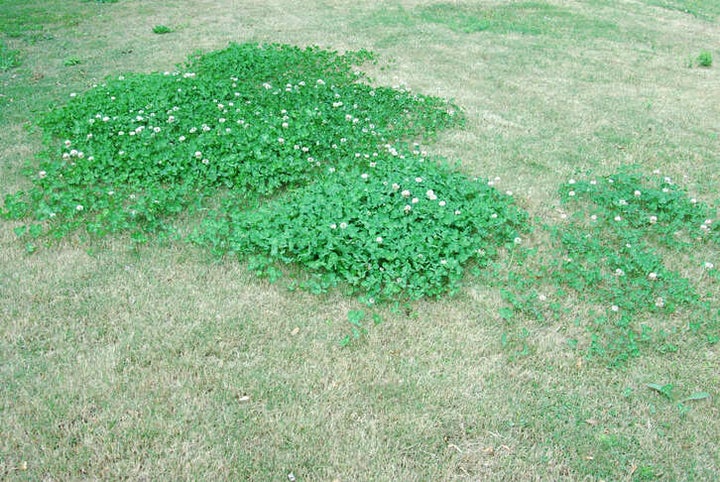
After all this, if you still decide to use pesticides, following the steps below will help to limit risks to people, wildlife, pets and the environment:
1. Choose an appropriate product
- Identify the cause of the problem. Comprehensive RHS web pages on garden wildlife, weeds and common plant diseases are free and available to all. For RHS members, the RHS Gardening Advice service can help with identifying problems. Inaccurate identification could result in unnecessary use of a pesticide.
- Determine the correct time to apply a chemical. Invertebrates often have one or more stages in their life cycle when they are more vulnerable to chemical control; spraying at the wrong time will give little or no control. Inspect plants at regular intervals so that problems are tackled before large populations have developed.
- Check the product label before buying. Labels include information on when, where and how often the product can be used. Do not purchase large amounts of pesticide that will take many years to use up. If only a few plants require treatment, a ready-to-use formulation is likely to be the most appropriate.
- Be aware of restrictions for edible plants. Check that the pesticide is suitable for a particular edible plant and note the instructions for the necessary time between application and harvest (harvest interval), as well as the maximum number of applications permitted per growing season.
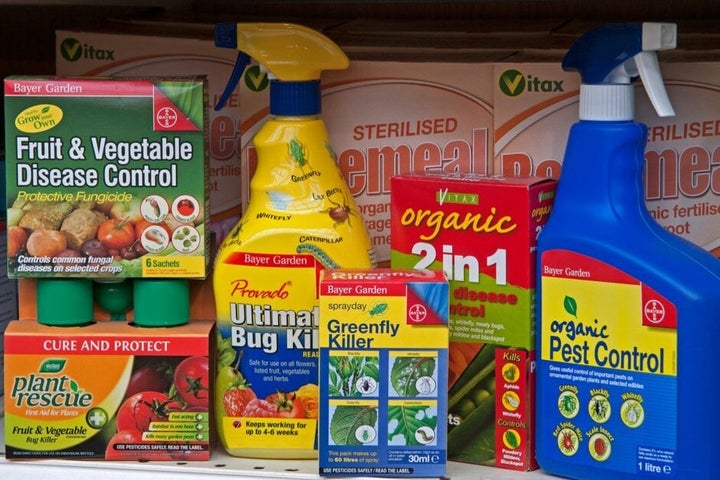
2. Familiarise yourself with the instructions
- Understand and adhere to the label. Read the instructions carefully before use. Dilute as directed and apply at specified intervals.
- Do not mix different chemicals together. Only mix products if the manufacturer’s instructions state this is permissible. This includes foliar feeds and liquid fertilisers.
- Use separate equipment. When using concentrated products, rather than ready-to-use products, have separate sprayers for applying herbicides and insecticides/fungicides.
3. Protect yourself and others during application
- Exclude people and pets while spraying. Keep children, vulnerable adults and pets away from the area while spraying and until foliage is dry.
- Protect yourself from direct contact with pesticides. Avoid contact with exposed parts of the body, particularly the eyes and mouth. Wash off any splashes immediately. Avoid breathing in dusts or sprays by standing up-wind while treating. Do not smoke, eat or drink while applying pesticides and wash your hands after use. As an added safety measure, wear rubber gloves when handling and applying pesticide.
4. Store chemicals safely
- Clean equipment after use. After spraying, rinse the sprayer with three washes of a small amount of water, spraying this onto areas, plants or weeds listed on the label.
- Keep chemicals somewhere safe. This should be a cool, dark, frost-proof place, preferably in a locked container where children and pets cannot gain access. Chemical products must be kept in their original containers with the tops firmly closed.
5. Limit wider environmental damage
- Check equipment. When using sprayers or watering cans to apply chemicals, check for leaks and blockages by using clean water before use.
- Avoid drift and potential plant damage. Do not use pesticides in wet, windy, very calm or hot, sunny weather, or when plants are suffering from drought. Check sensitivity to products on a small area or number of plants.
- Do not spray open blooms (including weeds). Spraying pesticides onto flowers puts bees, butterflies and other pollinators at risk.
- Avoid contaminating water. Fish and other wildlife in lakes, ponds and watercourses are very susceptible to pesticides. High-risk activities include flushing surplus pesticide down toilets or drains, applying weedkillers to hard surfaces where run off might enter drains and emptying pesticides on to the soil to dispose of them.
The RHS position on using chemicals in gardens
The RHS encourages all gardeners to boost in their gardens. Rather than using chemicals, we believe that avoiding pests, diseases and weeds by good practice in cultivation methods, selection, and encouraging or introducing natural enemies, should be the first line of control. If a gardener decides to use chemical controls, they should be the last resort, and should only be used in a minimal and highly targeted manner. For example, where pests, diseases or weeds pose a serious threat to the wider environment, to important heritage specimens, to habitat, or to wildlife. Notifiable species are regulated separately, and government requirements must be followed at all times.
The RHS Sustainability Strategy states that our aim is to be biodiversity net positive by 2025. This applies to our operations and to the gardening information and advice we provide. As part of this initiative, since spring 2023 the RHS has stopped selling registered in our Plant Centres and online.
To drive forward our integrated approach, we encourage and manage wildlife in our gardens. By making our gardens a haven for wildlife, they provide a natural balance. We also actively accept some damage to plants as this is a vital part of managing a healthy garden.
